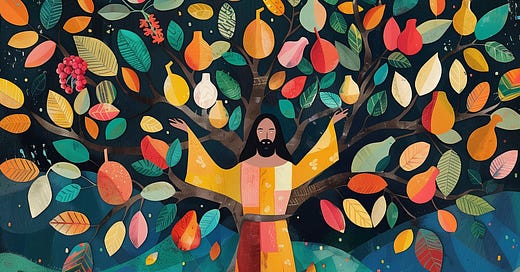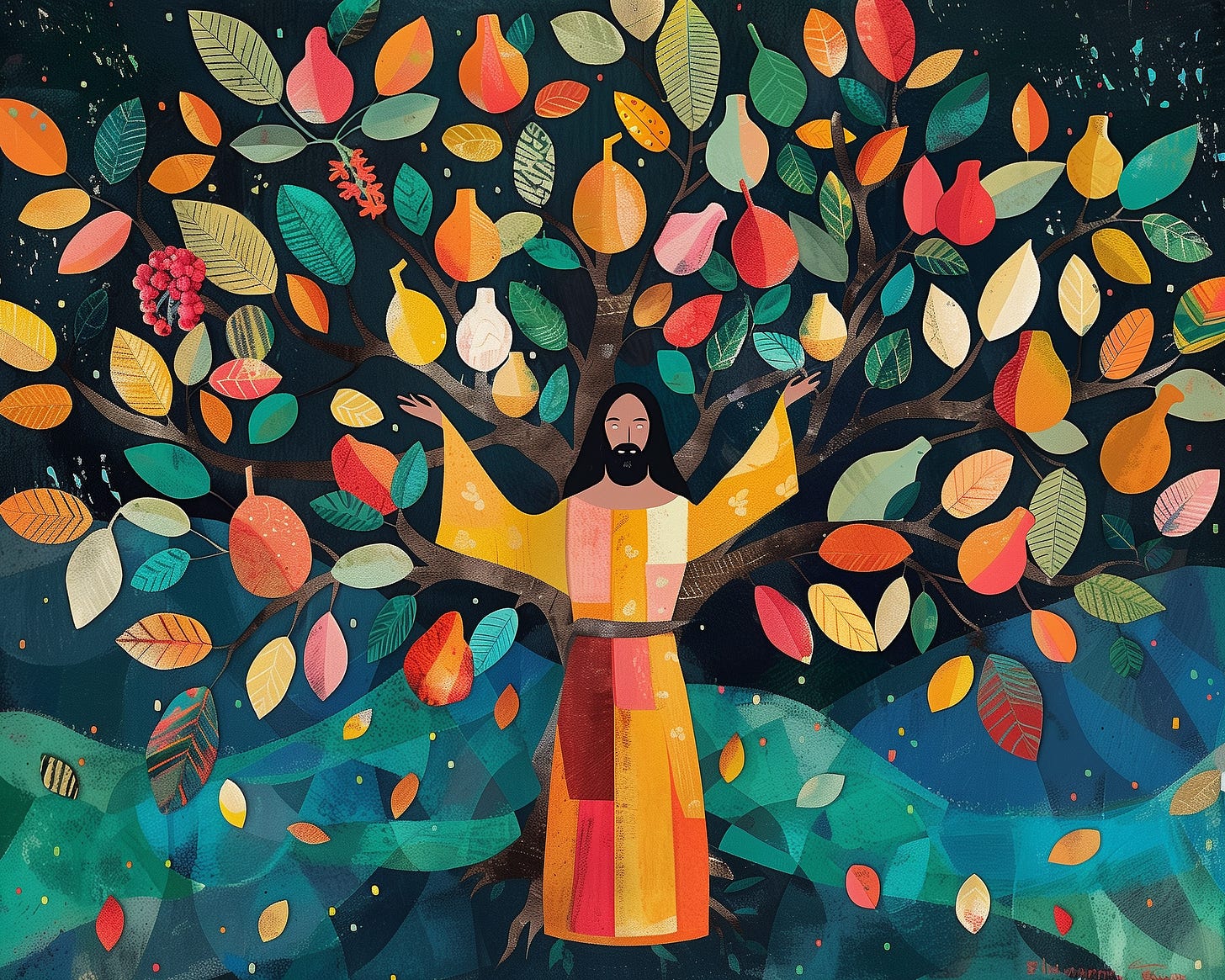The Bible presents a profound and rich tapestry of metaphors and teachings aimed at conveying deep spiritual truths. One of the central themes is that of humanity being created in the image of God, a concept introduced in the very first chapter of Genesis. This foundational idea sets the stage for understanding our purpose and identity as human beings. However, this image was marred by sin, and it is through Jesus Christ that we can be restored to our intended role as image bearers of God. This essay will explore how the Bible sets us up to understand that the ultimate representation of God occurs when we are grafted onto Jesus, who is depicted as a tree or vine. We will examine how bearing fruit involves duplicating ourselves in others as image bearers of God and contrast this with the consequences of not being grafted onto Jesus.
Created in God's Image
"So God created man in his own image, in the image of God he created him; male and female he created them." (Genesis 1:27, ESV)
The Hebrew word in Genesis 1:27 translated as “image” is Strong’s Concordance 6754. צֶ֫לֶם (tselem). Tselem is translated in other parts of the bible as “Idol”. For instance, in 2 Kings 11:18, Jehoiada and the people of Israel go into a temple of Baal and they “demolished the altars and smashed the ‘idols to pieces.” the word here is also tselem. For it’s worshipers, an idol is a representation of a god on earth. So it seems here to suggest that we are created to be an “idol“ or Image-bearer of God here on Earth.
When someone sees us, they are supposed to see a representation of God. That’s a sobering thought. That opens the question: have I been a good image-bearer of god on earth? Another question would be: What would a image-bearer of God on the earth look like?
The concept of being made in the image of God is a profound declaration of human identity and purpose. This declaration that God created mankind in His own image is not just a statement of fact but a revelation of our intrinsic value and purpose. To be made in the image of God means that we are a reflection of His character, endowed with qualities that mirror His nature. This includes our capacity for love, reason, creativity, and moral discernment.
However, being made in God's image goes beyond simply possessing certain attributes; it encompasses our entire being and purpose. We are called to be representatives of God on earth, to steward His creation, and to reflect His glory through our lives. The image of God in humanity signifies our role as God’s ambassadors, tasked with the mission to rule over creation with wisdom and compassion, as God would.
But this image was marred by the Fall. When Adam and Eve disobeyed God, sin entered the world, distorting the divine image within us. This marred image affects every aspect of our being, from our relationships to our inner selves. Despite this, the core truth remains: we are made in the image of God, and this identity sets the foundation for understanding our redemption and restoration through Jesus Christ.
Jesus, the True Vine
"I am the true vine, and my Father is the vinedresser. Every branch in me that does not bear fruit he takes away, and every branch that does bear fruit he prunes, that it may bear more fruit." (John 15:1-2, ESV)
In John 15, Jesus uses the metaphor of the vine to describe the essential nature of our relationship with Him. He states, "I am the true vine, and my Father is the vinedresser" (John 15:1, ESV). This metaphor is rich with meaning and echoes Old Testament imagery where Israel is often depicted as a vine or vineyard (Isaiah 5:1-7; Psalm 80:8-18). However, where Israel failed to produce the fruit God desired, Jesus declares Himself as the true vine that perfectly fulfills God’s purpose.
In this metaphor, Jesus emphasizes the necessity of being connected to Him in order to bear fruit. He is the source of life and nourishment, and apart from Him, we can do nothing (John 15:5). This connection to Jesus is not merely a superficial association but a deep, organic union. Just as branches are integral parts of the vine, deriving their life and sustenance from it, we too must abide in Christ to thrive spiritually.
The Father, as the vinedresser, actively works in our lives, pruning us so that we may bear more fruit. Pruning can be painful as it involves removing aspects of our lives that hinder our growth. However, this process is essential for our spiritual development and fruitfulness. It is through abiding in Jesus and submitting to the Father's pruning that we become more like Christ and better reflect God's image.
Bearing Fruit as Image Bearers
"But the fruit of the Spirit is love, joy, peace, patience, kindness, goodness, faithfulness, gentleness, self-control; against such things there is no law." (Galatians 5:22-23, ESV)
Bearing fruit is a key aspect of being image bearers of God. In Galatians 5:22-23, the Apostle Paul describes the fruit of the Spirit, which are the visible manifestations of a life transformed by the Holy Spirit. These qualities—love, joy, peace, patience, kindness, goodness, faithfulness, gentleness, and self-control—are not just moral virtues but reflections of God's character. As we bear these fruits, we mirror God's nature to the world.
The fruit of the Spirit stands in stark contrast to the works of the flesh, which Paul lists earlier in the chapter (Galatians 5:19-21). While the works of the flesh lead to division and destruction, the fruit of the Spirit fosters unity and builds up the community. This transformation from the works of the flesh to the fruit of the Spirit is only possible through the indwelling presence of the Holy Spirit, which we receive through faith in Jesus Christ.
Moreover, bearing fruit is not a solitary endeavor but a communal one. As we grow in the fruit of the Spirit, we influence those around us, helping them to also reflect God's image. This is how we "duplicate ourselves in other people to be 'image bearers' of God." Our lives become a testimony of God's grace and power, inspiring others to seek a relationship with Jesus and to be transformed by Him.
The Consequence of Not Bearing Fruit
"If anyone does not abide in me he is thrown away like a branch and withers; and the branches are gathered, thrown into the fire, and burned." (John 15:6, ESV)
Jesus does not shy away from warning about the consequences of not abiding in Him. In John 15:6, He states that branches that do not remain in Him are thrown away, wither, and are ultimately burned. This stark imagery underscores the seriousness of our need to remain connected to Jesus. Without Him, we lose our source of spiritual life and vitality.
The withering of a branch signifies spiritual death and separation from God. It illustrates the futility of attempting to live a life that reflects God's image apart from Jesus. Such a life, disconnected from the true vine, cannot bear fruit and thus cannot fulfill its intended purpose. The ultimate fate of these branches—being gathered and burned—serves as a sobering reminder of the eternal consequences of rejecting Jesus.
This passage challenges us to examine our lives and our relationship with Jesus. Are we abiding in Him, drawing our sustenance from His Word and Spirit, and bearing fruit that glorifies God? Or are we living independently, relying on our own strength and wisdom, which leads to spiritual barrenness? Jesus’ words call us to a renewed commitment to Him, recognizing that apart from Him, we can do nothing.
Jesus, the Perfect Image of God
"He is the image of the invisible God, the firstborn of all creation. For by him all things were created, in heaven and on earth, visible and invisible, whether thrones or dominions or rulers or authorities—all things were created through him and for him." (Colossians 1:15-16, ESV)
Jesus is the perfect image of the invisible God, as stated in Colossians 1:15. He perfectly embodies and reveals God's nature, character, and will. As the firstborn of all creation, Jesus holds preeminence over all things. He is not a created being but the eternal Son of God through whom all things were created. In Jesus, we see the fullness of God in human form, making Him the ultimate representation of what it means to be an image bearer of God.
Jesus' life, death, and resurrection provide the ultimate example and pathway for us to follow. Through His life, Jesus demonstrated perfect obedience to the Father, compassion for the marginalized, and a commitment to truth and justice. His teachings challenge us to live counterculturally, embodying the values of the Kingdom of God. In His death, Jesus took upon Himself the penalty for our sins, reconciling us to God and restoring the image of God within us. His resurrection assures us of new life and the power to live as transformed individuals.
By following Jesus, we are transformed into His likeness. This transformation is not merely external but a deep, inward change brought about by the Holy Spirit. As we behold Jesus, we are being transformed "from one degree of glory to another" (2 Corinthians 3:18, ESV). This process of sanctification involves daily surrender to Jesus, allowing His Spirit to shape our thoughts, attitudes, and actions to reflect His image more accurately.
Conclusion
Make no mistake; God calls us to be His image bearers, a role that is deeply rooted in our creation and restored through our relationship with Jesus Christ. Being made in the image of God is both an honor and a responsibility. It is through Jesus, the true vine, that we can fulfill this calling. By abiding in Him, we bear the fruit of the Spirit, reflecting God's character to the world. The consequences of not abiding in Jesus are severe, underscoring the necessity of our union with Him.
Jesus, as the perfect image of God, provides the ultimate example and means for us to fulfill our purpose.
Do you know Jesus, or have you been a good image-bearer of God to those around you? If not, say this prayer and enter into a relationship with Him today:
Father, I have not been a good image-bearer of you as you created me to be. I know now that your son came and lived a perfect life to show us exactly how to do that, then he died and rose again to give me the ability to finally be who you created me to be. Let me trust in Jesus, Lord, and follow in his ways. Let your Holy Spirit guide me by showing me the ways that I have been my own image-bearer instead of Jesus to my family, friends and community. I give up my way today, Lord, and accept yours as the only true way. Let your way flow through me to others and, like Jesus, bear the image of God so that more can know you and heal the world. It is in the powerful name of Jesus Christ that I pray. Amen!





